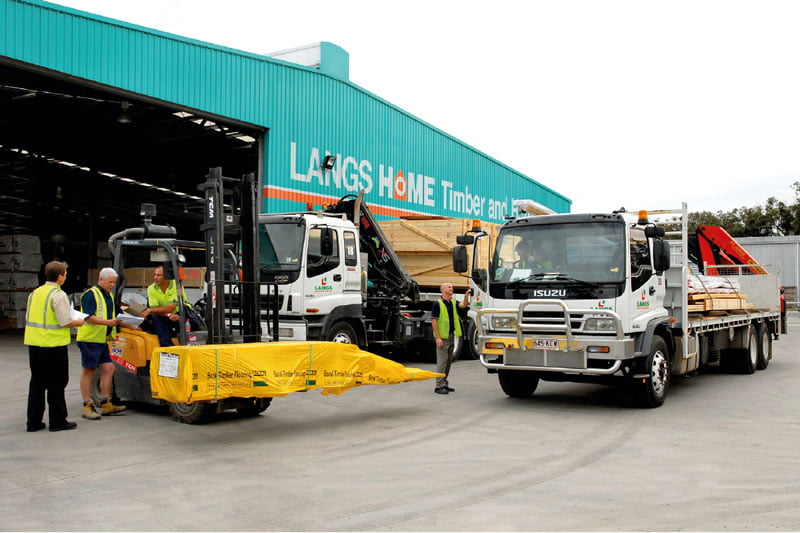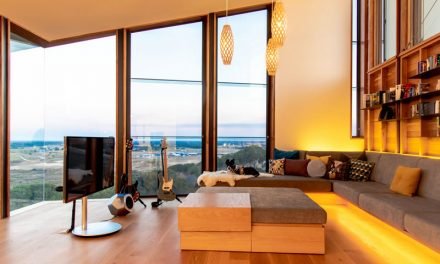This SE Queensland company was built with trade customers in mind.
In 1976, Bob Lang and his brother Max founded a new business. As a builder himself, Bob was tired of his difficulties in getting supplies, good service and quality products. Deciding to fill the gap they saw in the SE Queensland marketplace, they opened Lang Brothers Timber.
The company began as a backyard operation in Springwood and grew steadily to become the main local builders’ supply in Beenleigh by the mid-1980s. In 1989, the brothers decided to pursue different markets and Bob with his wife Glenys formed Langs Building Supplies. In 1990, a frame and truss manufacturing site at Yatala was added, which expanded to include a Building Supply Centre, aluminium windows and door manufacturing with a Home Hardware Store. Beenleigh closed along the way, and in 2017 a second, state-of-the-art operation opened at Caloundra. A third outlet is soon to be built at Ipswich.
“We’re trade specialists,” says CEO David Wuiske. “Half our business is manufactured products – frames, floor trusses and so on – and the other half is selling structural timber and builders’ hardware.”
The fabrication component of the business also grew out of Bob’s experience. “He had to pitch roofs himself,” says Wuiske, “and he realised there had to be an easier way than to lug heavy sections of timber up there, which is why he got into prefabrication.”
“The company’s formed around a detailed grass-roots knowledge of the industry,” says Jeff Lang, Bob’s son and joint managing director, who began his career as a carpenter. “We put all that knowledge and experience into practice, which is why we have such a good reputation with local builders.”
The company’s fabrication plant and timber yard mostly feature mechanically graded, plantation-grown timber, with some LVL that is increasing its market share. The majority is from two Queensland sources, Hyne Timber and AKD, topped up with imported timber from Stora Enso.
“You can build a whole house with what we sell,” says Wuiske. “Stumps, floors, walls, trusses, windows, doors and mouldings, metal roofs and cladding, right through to white goods. We can’t help you with tiles, but a polished timber floor? No problem!”
This one-stop shop approach, complete with highly trained personnel, explains the steady growth of the company, now with 350 staff members across the two sites.
“Our very first customer was a builder who worked alongside Bob,” says Wuiske. “Forty years on, he still holds an account with us.”
Practical understanding
Both Langs stores provide the company’s full range of services and products. “Our strategy is to have large sites that are replicated,” says Wuiske. “Whatever we can do on one site, we want to be able to do on the other, so the customer, whichever store they go to, gets the same experience and service offer.”
The two sites are over 8ha each. This allows Langs to hold a decent quantity of stock on site and manage its fabrication and delivery services. The Ipswich facility is needed because, as Wuiske puts it, “even large sites ‘max out’. We reach a point where we can’t physically load enough trucks or move enough stock in and out. At that point, we look to a new location.”
The choice of location was made carefully. The two existing stores are over 100km apart and Ipswich will be 60+km from Yatala. “We position them in growth areas,” says Lang. “There’s a boom in building up here and we want our stores to be as convenient for our customers as possible.”
As part of that focus on customer service, Langs has a fleet of over 30 trucks that use Roadpods, a trademarked transport solution invented by Bob. “We have multiple bases that can be fitted onto the trucks,” says Wuiske. “As the product’s manufactured, or as a part of an order arrives, we load it straight ‘onto the truck’, except that we’re actually loading safely onto a base at ground level, while the truck is out doing its job. We can then put that base into a storage rack if it’s not yet required.
“When it’s needed at the site, we lift the whole module onto the truck in about three minutes, where loading it would once have taken two hours.”
Bob designed the system knowing that the best-laid plans on a building site can be disrupted by a sudden downpour, or a sick essential worker. As Jeff Lang says, “It’s particularly useful if a job gets put off or comes back from site, we just pull it straight off the truck and put it in the rack and wait for the next delivery date.”
“It doesn’t cost us in space,” Wuisks adds. “Normally the pieces of a truss or frame have to sit on the ground because they’re not designed to be racked. Putting them on a base that can go into a rack doubles our storage space.”
Building experience
The majority of Langs customers are residential builders. “We do multi-res, mostly two storeys, some three storey, and attached housing,” says Wuiske.
“A lot of our builders are project builders,” says Lang. “Our facilities are designed to accommodate them. But about 20-30% of our general business is family builders. While we give all our customers the same quality of service, we know the two types have slightly different needs.”
Langs has teams of estimators and detailers who run Mitek programs and give expert feedback on the designs that come in from customers. “If the client wants to make a change, or if we can see some sort of issue arising, we’ll give them expert feedback and deliver the outcome they need,” says Lang. “We’re continually working with the builder and architect to get the systems right and to propose more efficient ways to run roofs and more cost-effective ways of doing things.”
For family builders, the company makes sure there is a staff member assigned to each who can help with everything from coordinating the logistics of their delivery schedule to liaising with the builder and other suppliers and helping the client understand the savings that can be made by limiting the number of suppliers.
“Every builder gets same high level of service,” says Lang. “That focus on customer service is what we’re known for in the industry and it’s why we get repeat business. But we do work to maximise being a one-stop shop for everyone, it just makes life so much easier for everyone, especially the builder.”
That said, the company has drawn strict limits around what they do. “We don’t try to be everything to everyone,” says Wuiske. “We don’t do kitchens, we don’t do staircases. We can sell you the timber to build a staircase, but we don’t prefabricate them – yet. We stick to the core of what we know.”
Which isn’t to say Langs hasn’t shifted with the times. LVL has taken over from green-sawn hardwood. “Builders like it, because it’s so consistent,” says Wuiske. “They know exactly what they’re going to get and how it’s going to perform and how easy it is to use.”
And they’re prepared for the next changes to the industry, too. “We’re not panellising yet,” Wuiske adds. “Over the years Bob has built floor cassettes and wall panels, but we don’t think the market’s quite ready for it yet in Australia. It’s coming, and when the time is right we’ll move into it.”
Group Leverage
The other side of Langs’ success is its staff. They invest strongly in training and development, and many stay with the company for years.
“We’ve got one staff member who’s been here for decades, then his son joined, and now the grandson is here, too” says Wuiske.
Collaborations with partner industry associations are leveraged to help staff improve skills. Chainsaw and timber grading courses at Timber Queensland are popular, as are TABMA courses: “We’ve been a part of the TABMA apprenticeship program and put a couple of apprentices through,” says Lang.
Recently, the company has partnered with All Trades Queensland to bring in Year 2 and Year 3 apprentices. “We’re just trialling that, but it seems to be working quite well,” says Wuiske. “They’ve got some of the skills we need: they know how to hold and use a nail gun and swing a hammer.”
Management courses are also popular among the white-collar staff and the growth of the company means there are plenty of opportunities to progress within the business.
“We care for our employees, and if we have a mutually satisfying relationship with them, we say they’ve got a job here for life,” says Wuiske.
To guarantee the longevity of Langs, the company structure has evolved. “Bob’s still involved, but we have an executive management team of five people to manage the day-to-day business,” says Lang. “Across the five of us, we cover a large range of the skills and experiences the business relies on.”
Another change was the shift from sourcing and negotiating their own deals with suppliers to joining the Independent Hardware Group (IHG) and leveraging off group volumes to increase profitability. “It was difficult to sell the idea to Bob at first,” says Wuiske. “He didn’t want us to lose our focus on supplying trade. But what we found was an improved offer to the trade. You’re not going to find outdoor furniture in our trade store, but what IHG allowed us to do is add things tradies like – good hammers, drills – and expand our hardware range. The depth of range available through IHG means we benefit from mass–pricing compared to standing on our own and the IHG warehouses mean we can buy small quantities of a much larger range of products.”
That evolution already has a next generation waiting. “I grew up wanting to do what my father was doing,” says Lang. “My 16-year-old son’s no different: he can’t wait to get involved and join me in the family business.”
For more information, visit www.langs.net.au













